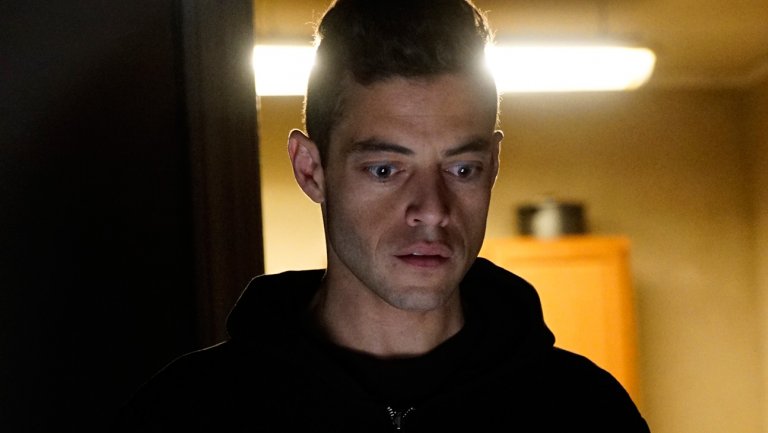Cyber buzz has replaced word of mouth as the method of growing viewership.
When Mr. Robot premiered back in June, it was disguised incognito as hacktivist Elliot Alderson’s millennial commentary on society. During the summer slumber period, it was a swaying tree branch tapping on the window on Wednesday nights
Like LOST’s Walkabout episode or Ned’s beheading to end the penultimate episode to Game of Thrones’ first season, Mr. Robot episodes 8 and 9 were smoke alarms near an open window, waking the entire block. What was once a hacker thriller became a psychological one as well. You’re never quite sure anymore if Elliot’s monologues are taking place internally or externally. After the revelations about Mr. Robot’s identity, the viewer isn’t sure if his dialogues are either. As a result of their Durdenesque twist, ratings skyrocketed for the season’s penultimate episode.
The hype doesn’t even include the shocking endings to the two previous episodes, which included Elliot finding a pivotal characters’ body in the trunk. You’re never quite sure if Elliot’s monologues are taking place internally or externally. After the Mr. Robot revelation, the viewer isn’t sure if his dialogues are either.
The season finale was supposed to be the scorching fire, blazing a trail across social media, laptop and television screens. That will be delayed by a week because of the USA Networks decision to delay the season finale for a week.
In his 1889 essay, The Decay of Lying, Oscar Wilde wrote the oft-quoted phrase, “Life imitates art far more than art imitates life.”
Sometimes the universe conspires for art and life to synchronize.
As shrewd as it may sound, more attention will be drawn to next week’s finale based upon the publicity it will receive for delay its finale because of the coincidental similarities between a filmed scene that resulted in the postponement and the tragic shooting in Roanoke, Virginia. These things happen.
In early 2013, Vince Vaughn’s The Neighborhood Watch changed its name to The Watch after Trayvon Martin was killed by George Zimmerman. After 9/11, Arnold Schwarzenegger’s Collateral Damage was delayed for months.
Next week, Mr. Robot will proceed with its highly anticipated season finale. How it sets up season 2 and the consequences of season 1’s actions will set the mood lighting for Mr. Robot’s future.
An intriguing series that garners buzz so early in its run can diverge into two paths. Had Mr. Robot lost momentum, it would have been a show stuck in a ditch like TNT’s Falling Skies or HBO’s The Leftovers. Elliot considers anonymity nirvana, hovering in suspended animation in the atmosphere above the booming television metropolis is a fate familiar to Graceland, Psych, Burn Notice, White Collar, Covert Affairs or all the way back to The 4400.
USA Network has built its foundation atop what they call “blue skies” programming. These upbeat, chic series have been adequate strategy for attracting viewers, but failed to create cult followings. They’re the type of series that you can skip out on for an entire season and realize during the next season premiere that you haven’t missed much.
Two years ago, the USA network was on the verge of going all in on sitcoms and reality series’.
However, three-quarters of the way through the 2014 calendar season, ratings were down and NBCUniversal president Steve Burke was painting a bleak picture of a changing environment explaining that, “The fact of the matter is the next five to 10 years in basic entertainment cable as it relates to ratings are going to be much more difficult than the last five to 10 years.”
Between the third quarter of 2013 and 2014 prime-time viewership declined by 150,000 eyeballs daily (plus three days of delayed viewing via on-demand, DVR, etc.)
On-demand content has trumped linear viewing, meaning that a quality thriller which invites dedicated weekly viewing to stay on top of the mysterious plot becomes even more valuable.
That a psychologically-gripping thriller would find a home among the USA Network’s solarium of sunny procedural fare is a testament to the new age of television. Mr. Robot is a sophisticated series that probably belongs in a den of dramas on AMC, FX or HBO.
Like most filmmakers, creator Sam Esmail’s protagonist is an extension of himself. For one, both Esmail and Rami Malek, the actor who plays Elliot are Egyptian. Naturally, the Arab Spring, which swept through the Middle East, including Egypt and Twitter, served as an inspiration for his hacktivist’s tale.
Mr. Robot is the millenial John Connor taking on E Corp instead of Skynet. It’s also the genesis of a revolution for the USA Network.



